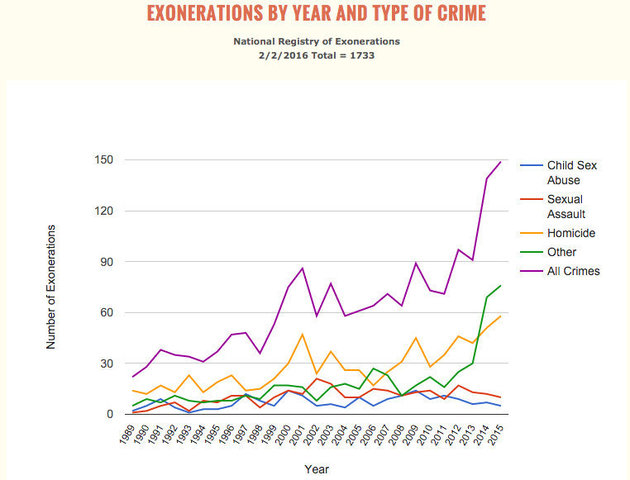It was a busy year for Innocence Network affiliated organizations. According to a recent report by the National Registry of Exonerations (Registry), researchers found that 149 people were cleared in 2015 for crimes they didn’t commit — more than any other year in history.
The busy trend continued throughout the winter months with Innocence Network affiliated organizations playing a key role in nine out of fifteen exonerations documented by the Registry between December 2015 and January 2016. According to the Registry, there have been 1,733 exonerations nationwide since 1989.
In December, exonerees finally caught a tax break with Congress’s passing of House Resolution 3086, the Wrongful Conviction Tax Relief Act of 2015. Passed with bipartisan support, the Act, introduced by Representatives Sam Johnson (R-TX) and John Larson (D-NY) and supported by several members of the senate, eliminates federal income tax on wrongful conviction compensation. That is good news for exonerees in the 30 states that provide exoneree compensation.
A number of states that provide compensation have highly inadequate statutes. Wisconsin, for example, currently provides exonerees only $5,000 per year of wrongful incarceration, capped at $25,000. In January, a Senate committee gave unanimous support to a bipartisan bill (Assembly Bill 460/Senate Bill 322) to dramatically increase payouts for people wrongly convicted of crimes in Wisconsin. The proposed bill would increase the statute to $50,000 per year of wrongful incarceration and cap payments at $1 million. The bill would also provide health care services for the exoneree.
Several states are also working to improve eyewitness identification police practices. The Missouri State Legislature is currently taking up the issue with Senate Bill 842. The bill calls for the adoption of a number of evidence-based practices including blind administration of lineups and recording of confidence statements.
Nebraska Senator Patty Pensing Brooks, is also supporting efforts in her state to implement eyewitness identification best practices with the introduction of Legislative Bill 846 which would require each agency to develop a written policy and submit a copy to the Nebraska Commission on Law Enforcement and Criminal Justice. Each agency would be required to follow best practices developed by the National Research Council, International Association of Chiefs of Police and the American Bar Association.
As a means to support network affiliated organizations and other individuals involved in the innocence movement, the Innocence Network hosts an annual conference. This year’s conference will be held in San Antonio, Texas from April 7-9. At the conference, NCIP staff will be leading a panel on the implementation of effective conviction review units and presenting information about challenges to child sexual assault cases postconviction. Over 550 attendees are expected, including at least 150 exonerees. For more information, click here.
Exonerations in December 2015 and January 2016*
|
Ben Baker |
|
Marvin Roberts, Kevin Pease, George Frese and Eugene Vent State: AK |
|
State: TX |
|
State: PA |
|
Amaury Villalobos, William Vasquez, and Raymond Mora State: NY |
|
State: AL |
|
State: KS |
|
State: TX |
|
State: WA |
*Source: http://www.law.umich.edu/special/exoneration/Pages/featured.aspx
